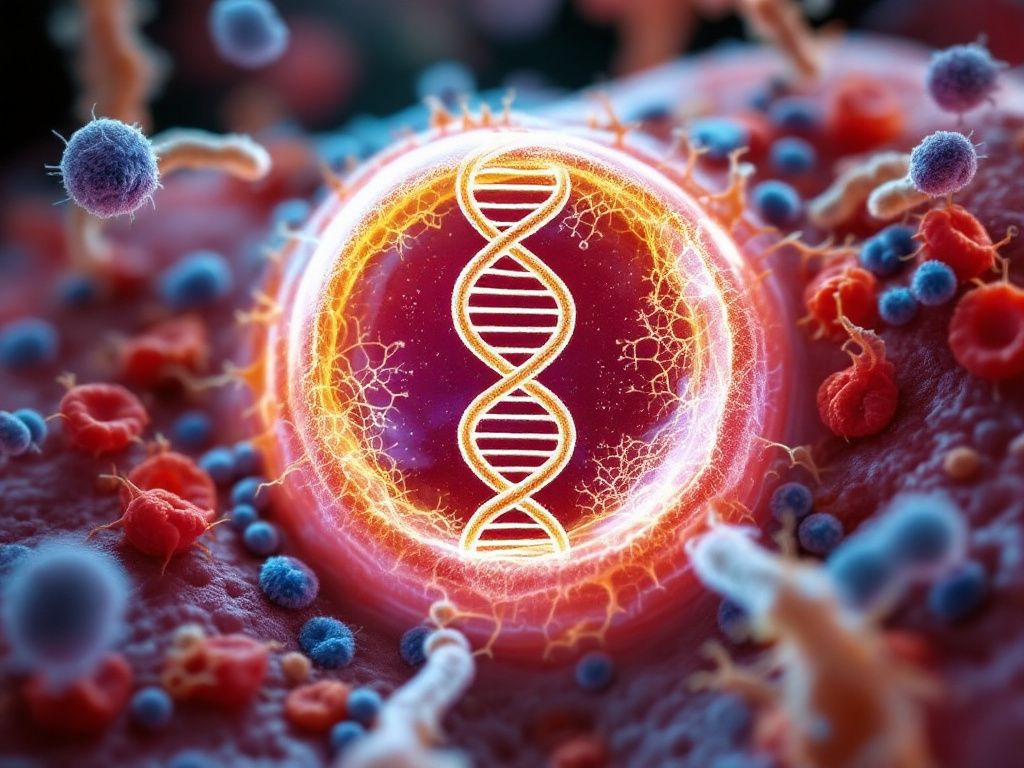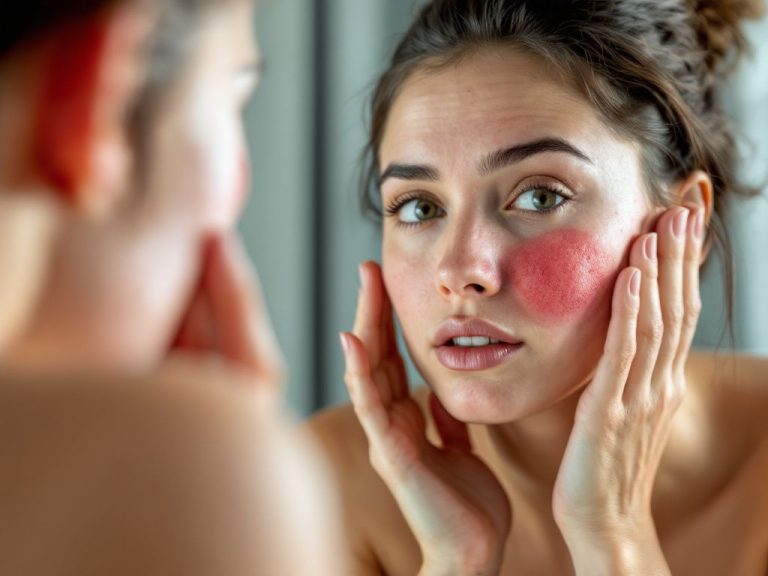You ever find yourself peering into the mirror, staring deeply at that stubborn pimple sitting on your face and think, “Why, oh why?” Well, apart from the usual culprits like hormones, diet, or stress, there’s another silent player we don’t often think about as much – our genetics. Yes, the age-old debate of genetics versus everything else might hold some answers to why acne tends to stick around longer for some of us. Let’s dive into this intriguing exploration of genetic acne factors and see if we can unravel some of the mysteries hiding behind your skin’s surface.
Table of Contents
ToggleThe Basics: What is Acne?
Before we jump on the genetics train, let’s lay down the foundation. Acne – nothing too complicated on the outside; you see it as pimples, blackheads, and whiteheads predominantly popping up on the face, back, or shoulders. Underneath that surface, things are a bit more complex. Acne occurs when hair follicles get clogged with oil and dead skin cells. Throw in some bacteria, and voila – you’ve got yourself a breakout.
But why does this happen to some people and not others? Now, here’s where it gets interesting. It’s not just about having oily skin or not washing your face enough. These are superficial factors. Think of them as the top of the iceberg. The real depth lies beneath, in the intricate coding of our genes.
Genetics: The Acne Suspect
Let’s get into the heart of it – genetic influence. If you’ve ever pointed an accusing finger at mom and dad for your moonlit complexion, you might be onto something. Scientific studies have shown that there indeed seems to be a genetic component to acne. So, thanks, family.
The hereditary aspects can manifest in various forms. You might inherit large pores, for instance, which are prone to getting clogged. Or, perhaps a heightened hormonal response during stress periods that tend to make your skin oilier than average. Genes also determine the response of your immune system to the P. acnes bacteria, one of the common causes of pimples.
Scientific Analysis of Genetic Acne Factors
Alright, here’s where things get geeky – and a bit fascinating for those who like peeling back layers, literally and metaphorically. Scientists have identified several genetic markers that seem to correspond with a higher likelihood of developing acne. These markers can affect factors such as sebum production, the division of cells in your follicles, and your overall skin immune response. So, if your mother dealt with severe cystic acne not marked solely by her teenage neglect – surprise, it might partly be in your blueprint.

Interestingly, twin studies (side note: these are especially fun because of the identical genetic material) consistently indicate a considerably high correlation for acne severity between monozygotic (identical) twins compared to dizygotic (fraternal) twins. This strongly suggests genes are involved, though environment plays its part.
How Researchers Decode Acne’s Genetic Influence
You might be wondering, how do researchers even start approaching something like this? With advanced genomic methodologies, scientists can analyze large genome-wide association studies (GWAS) that hunt down specific genetic variations. These variations give insights into acne’s development and the underlying biology driving it.
Let’s be clear: no single gene spells out acne for everyone. Rather, it’s about combinations of variations that tilt the scale. Essentially, some sequences might mean your skin over-produces oil while others imply your susceptibility to certain bacteria is higher. It’s a complex puzzle, but making some important breakthroughs has provided paths for personalized acne treatments, which really is the next frontier.
Environmental Interplay: Nurturing Nature
What’s great about acne—and trust me, that’s quite a bit of silver lining—is beyond genetics are environmental factors equally impactful. Imagine them overlaid on your genetic framework. Things like your diet, skin regimen, and stress management routines all dance with your genetic predisposition like old friends, sometimes enemies. Understanding this dance is crucial if you get serious about long-term acne control.
Choosing Your Player: Nature or Nurture?
To borrow a relatively simple analogy, let’s think about how genes set the stage and environment controls the temperature. That’s how hereditary aspects influence acne. Genes decide your skin type, ultimately making it easier or harder for skin irritants to stir trouble. For example, a naturally oily skin type needs an adjusted cleansing routine. A wise approach might be committing to good lifestyle habits that set optimal background conditions.
Hormonal Influence and its Genetic Ties
Hormones are often inextricable from conversations about acne, thanks in part to puberty (what a time, right?). Could these too be genetically rooted? Absolutely. Hormone levels can be influenced by hereditary factors, which determine our sebaceous gland activity. Polycystic Ovary Syndrome (PCOS) is an excellent example where genetic predisposition leads to hormonal imbalances manifesting as, you guessed it, adult acne.

Let’s Talk Practical Skin Solutions
Now, let’s be real—just because something is in our DNA doesn’t mean we should wave a white flag and give in to fate. Nope, that’s not today’s narrative. Science exists to be actionable. So here’s how we make those genes of ours work with us, not against us.
- Know Your Skin Type: Establish whether your skin is oily, dry, or combination. This impacts how you formulate any skin care regime. Genetic acne factors may lead to a misdiagnosis if you’re merely fighting oily spots rather than considering the gene-derived sensitivity your skin warrants.
- Tailor Your Skincare: Unlike standard diets that promise clear skin, crafting a routine suited to your specific needs based on your skin type and reaction patterns might help tailor a solution acting at gene level—meaning treatments that reduce oil to bacteria proliferation.
- Consultation Advantage: Genetic acne can be a powerful argument for dermatology consultations. Armed with gene-rooted dynamics knowledge, you can engage effectively with your healthcare provider, tackling causes comprehensively rather than symptomatically.
- Look Into Parallels: Assess family acne history – especially thinking along hereditary aspects—seeking relevant sets of practices or patterns; understanding communal scenarios can alleviate unknown fears.
Toothbrush Mentality: Consistency is Key
It may sound obvious but don’t underestimate the power of a diligent routine. We industriously clean our teeth without expecting an instant shine. The same logic can be applied to our skincare routine – hydrate, cleanse, protect, repeat.
Tear Down the Myths
Alongside age-old scientific inquiry follows persistent myths. When addressing genetic acne factors, let’s sweep away extreme portrayals that absent genetic intervention, myths (essentially falsifying acne causes mergers) cannot co-function truthfully.

- Myth: “Pizza alone ruined my face!”
While we don’t dismiss lifestyle influence, and trust me, ongoing greasy fingers won’t fare well acutely
- Myth: “It ends with puberty…”
Not necessarily—it just shapes into new expression forms driven by hormonal fluctuations.
The Genetic Acne Checklist
Doing something about a problem can often help alleviate the distress, even when it’s about dealing with those untouchy genetic details. Here’s a simple checklist to tromp which key genetic acne factors play a role:
- Family Background Check: Plausible signs pointing toward acne as family known occurrence.
- Understanding Inheritance Patterns: Increased acne frequency due to any shared genetic inheritance.
- Specific Skincare Inquiry: A known specialization toward hybrid skincare best practiced, treating skin differently.
- Derma Dialogues: Possible treatment methodologies capitalizing on modern synthetic retinoid success fostering anti-acne efforts.
Final Word: Seize Control
It might feel a little like fighting destiny when grappling with genetically influenced acne, but let’s flip that around. Imagine understanding a map handed over by genetics allowing you prep smart defenses, instead of reacting chaotically. Genetic influence sets the background rhythm, but you play the music that people hear. Whether through carefully designed routines, consultations, or scientific advances, working with what you have can change everything.
In the grand scheme of things, knowing genetic acne factors means taking some mystery out of acne—giving back the control that sporadic breakouts often seem to rip apart.
Remember, you’re as capable as anyone whose mirror doesn’t throw daily challenges. Stay informed, stay proactive, and your future self will high-five you for this.
Frequently Asked Questions
Is Acne Primarily Caused by Genetic Factors?
Yes, acne is significantly influenced by genetic factors. Research indicates that genetics play a more substantial role in the development of acne than environmental factors. Genetic variations can affect how the immune system responds to bacteria like *P. acnes*, and they can also influence sebum production and pore clogging[2][4].
Which Specific Genes Are Associated with Acne?
Several genes have been linked to acne, including those involved in inflammation such as *IL*, *TNF*, and *RETN*. Other genes like those in the *CYP* family, *MMPs*, and *TIMPs* also play a role. These genetic variants can affect the progression and severity of acne[1][3][5].
How Do Genetic Factors Influence the Severity and Type of Acne?
Genetic factors can influence the severity and type of acne by affecting various aspects such as sebum production, follicular keratinization, and inflammatory responses. For example, certain genetic variants can lead to overproduction of dead skin cells, which can clog pores and result in different types of acne, such as blackheads or cystic acne[2][3].
Can Genetic Acne Be Managed or Treated?
While genetic factors cannot be changed, managing genetic acne is possible through lifestyle adjustments and skincare routines. This includes maintaining a simple yet effective skincare routine, managing stress levels, eating a balanced diet, and consulting a dermatologist for personalized treatments[2].
References







